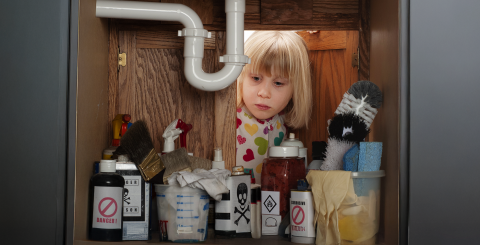10 home insurance questions you’ve always wanted to ask [2023]

You probably know that home insurance is essential to protecting your home and enjoying it with peace of mind. But there may be some things you don't know about it, such as how it works or what kind of coverage it provides in the event of a loss or any other unfortunate incident.
Got questions about home insurance? Don’t worry, we’ve got the answers! Here are some of the questions most frequently asked by our members.
Question 1. What does my home insurance include and cover?
Basic home insurance includes two main types of coverage: civil liability and property insurance.
Civil liability insurance: It protects you in the event you are held responsible for unintentional physical damage or bodily harm caused to a third party.
Property insurance: This covers your home and any outbuildings as well as your personal property. It protects against certain types of damage, such as fire, theft, vandalism, and windstorms, and can be useful in protecting you from more specific water damage, such as overflowing toilets and bathtubs.
In general, there are two types of home insurance policies. The first is the so-called “comprehensive” policy, which covers everything not excluded in the insurance contract. The second is called a “specified perils” policy and covers only those risks provided for in the insurance contract. You can choose the type of policy that best suits your situation based on your needs.
You can also add optional coverages, known as “endorsements,” to your home insurance policy to protect your property against certain risks that aren't automatically covered in basic home insurance contracts, such as above-ground water damage (e.g., water seepage through the roof), sewer backup, and earthquake damage. Before refusing any additional coverage available to you, it’s important to consider the financial consequences of an uninsured loss.
It’s important to remember that home insurance is tailored to your needs and offers coverage that’s right for you, whether you’re a homeowner, condo owner, or even a tenant.
Please note: All policies are subject to conditions, limitations, and exclusions. That’s why it’s important to discuss with your damage insurance representative what is and isn’t included in your coverage when purchasing home insurance.
Question 2. How do I determine the amount of insurance required for my property?
The amount of insurance required for your home is its rebuild value at the time you take out your home insurance policy. Damage insurance representatives refer to guides to help you determine the rebuild value of your property. However, these tools don’t provide the same level of accuracy as a building appraisal performed by a professional chartered appraiser. What’s more, despite the help provided by your damage insurance representative, it’s up to you to determine the amount of insurance required.
Question 3. How do I determine the value of my personal property?
The best way to find out the real value of your personal property, furniture, and valuables, i.e., what it would cost to replace them today, is to take an inventory of them. Here are some things to consider including on the list:
- Your clothes
- Your furniture
- Your household appliances
- Your electronic equipment
- Your computers
- Your outdoor facilities and equipment (BBQ, fireplace, contents of your shed, etc.)
- Your sports equipment
- Your collections of books, records, movies, etc.
- Your decorative items
- Your jewellery
- Your tools
- Your wine cellar
- Your hearing aids
- Your children’s toys
- And more
Don't overlook anything, and update this inventory frequently, adding your purchases as you go! Then figure out how much it would cost to replace everything as of today, including taxes. Don’t underestimate the value of your personal property, and make sure you have enough insurance to cover everything you own.
Good to know: Promutuel Insurance provides you with an electronic form to complete to help you take an inventory of your personal property in each room of your home. Don’t know where to start? Start THERE: property inventory form.
Question 4. Are my pool and hot tub covered by my home insurance?
In short, not automatically, not everywhere, and not for everything. Your home insurance covers damage to your property and home caused by your pool, hot tub, and so on, as well as your third-party liability for bodily harm or property damage caused to others by your pool or hot tub. However, damage caused directly to your pool or hot tub, its maintenance equipment, and any decks attached to it but not attached to your home, is not automatically covered by your home insurance policy. Coverage varies according to the type of contract and feature.
To make sure you have sufficient coverage for the water feature outside your home, its equipment, and its decks, you may need to add additional coverage to your home insurance policy called an “endorsement.” This will enable you to be compensated if the feature needs to be repaired or replaced, subject to certain conditions, limitations, and exclusions.
Important: It’s essential to inform your damage insurance representative if there is a pool or hot tub on your property, to avoid unpleasant surprises following damage caused by your water feature or damage caused directly to it. Your representative can then inform you of what is automatically included in your home insurance policy and what additional coverage can be added to protect your feature. This advice will help you make an informed choice about the coverage that best suits your needs.
Question 5. Is my shed covered by my home insurance?
If you are a homeowner or condo owner, structures that are completely separate from the residence, such as a shed or garage, are generally covered by your home insurance policy. However, since these features can increase the value of your property, you should inform your damage insurance representative of their existence and value. That way, they can adjust the amount of insurance in your policy so that you can enjoy your backyard with complete peace of mind and be properly compensated in the event of a claim.
Question 6. What other personal property should I take out additional insurance for?
Generally speaking, home insurance covers your furniture, appliances, and clothing, in addition to your other personal property, up to the amount specified in the policy. However, a home insurance policy also has limitations on certain types of property, including:
- Bicycles
- Lawnmowers and garden tractors
- Snow blowers
- Golf carts
- Boats or other watercraft (including marine engines and equipment)
- Jewellery and watches
- Stamp, coin, card, and other collections
- Works of art
- Software
- Property for business use
- And more
If any limitations apply, your compensation in the event of a claim will be limited to the amount specified in your home insurance policy. For example, the compensation payable in the event your bike is stolen could be limited, depending on your policy. If you feel the amount of compensation provided for in your policy doesn’t reflect the replacement value of your bicycle, talk to your damage insurance representative about increasing the amount of insurance.
Drawing up a complete inventory of your personal property and properly assessing its value will enable you to check with your damage insurance representative whether the basic coverage suits your needs or whether a higher amount of insurance is more appropriate for your situation.
Question 7. What is a deductible?
A deductible is the amount of covered damage you agree to pay out of your own pocket in the event of a loss. Let’s take a home insurance policy with a $500 deductible as an example. If your home is burglarized and you make a claim for $5,500, you will have to pay only $500, and your insurer will pay $5,000. The deductible applies to every claim, except for those exceptions mentioned in the policy.
Question 8. How can I save on my home insurance premium and prevent future claims?
Everyone likes to save money. Here are a few tips to help you reduce your home insurance premium without compromising your coverage:
- Use the same insurer for all your insurance needs (car insurance, home insurance, etc.). You could benefit from several advantages by combining them!
- Increase your deductible. But make sure you can pay it in the event of a claim.
- Install a fire and burglar alarm system linked to a monitoring station. By reducing the risks associated with your home, you could qualify for a discount on your premium!
- Equip your home with a water leak detection system. Again, the more you reduce the risk of damage, the more you could save.
- Let your damage insurance representative know if you’ve paid off your mortgage.
Take other preventive measures that may reduce the risk of claims and inform your damage representative of them. For example:
- Have your chimney swept regularly by a professional.
- Fence your yard and lock the gate.
- Do some renovations to refurbish your property’s roof or windows.
- Install secure locks on doors and windows.
Question 9. Why is it important to update my insurance policy regularly?
Your situation changes—and so does your personal property! Regularly reviewing your home insurance allows you to ensure your policy meets your current needs and covers your property and belongings at their fair value. To update your home insurance policy, it’s important to inform your damage insurance representative of recent changes in your life and your home, such as:
- The addition of an office or business activity to your home
- The addition of a spouse, roommate, or lodger
- Use of the insured property or premises (short-term rental, vacant building, etc.)
- Transfer of ownership following a separation or divorce
- A new pet
- Major renovations
- Installation or removal of a pool or hot tub
- Installation or removal of a fire or burglar alarm system or a water leak detection system linked to a monitoring station
- Acquisition of additional personal property
- And more
By reviewing your home insurance policy, you could:
- Benefit from coverage and insurance amounts that reflect your actual needs.
- Pay a fairer premium based on your insurance needs.
- Avoid unpleasant surprises in the event of a loss.
- Have an up-to-date list of your personal property .
Question 10. I work from home. Are my business property and place of practice covered?
No. Home insurance doesn’t cover your business activities, whether it’s a hair salon, daycare, massage therapy clinic, or even a simple consulting service as a self-employed worker.
If you work from home (either full-time or part-time) for yourself or your business is located in your place of residence, your home insurance doesn’t cover certain things, including:
- 100% of your business property
- Your third-party liability as a self-employed worker or for business premises in your home
- Loss of income following a loss
For teleworkers (people working from home on behalf of an employer), property for business use is covered by the home insurance policy, but subject to certain limitations that may vary depending on the type of policy.
It’s a good idea to talk to your damage insurance representative to make your home insurance plan work for you. They may suggest that you add additional coverage to your home insurance policy or take out another type of insurance, such as homeworker business insurance, if the risks associated with the nature of your business are too high to be covered by your home insurance policy.
THERE to answer your questions
We hope these answers help you better understand your home insurance and make the necessary adjustments to your policy to improve your coverage and protect you in the event of a loss.
Have more questions about home insurance? Feel free to contact us! One of our damage insurance representatives will be happy to help you better understand your coverage.
Looking for personalized benefits and discounts that save you money? Request a home insurance quote online today!



